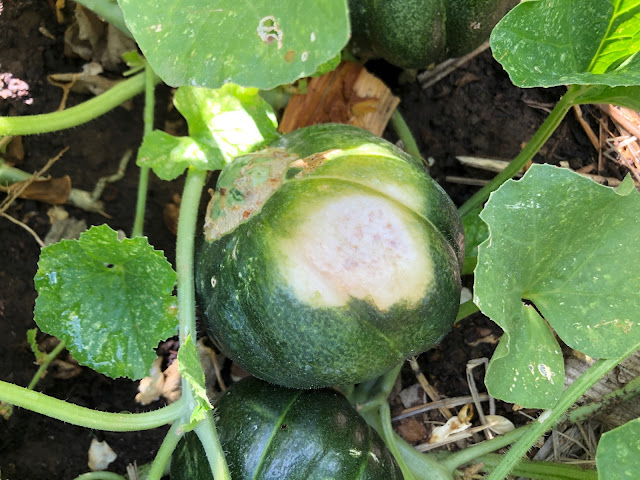
Don't let your garden fry this week

|
| Melons get sunburned, too. See the hacks post linked below to protect them. (Photo: Kathy Morrison) |
Argh, here comes another heat wave. A heat advisory has been issued for Thursday through Saturday in the Sacramento area.
We gardeners can hide inside. Our plants aren't so lucky.
Fortunately, we here at Sacramento Digs Gardening have a lot of experience with gardens and heat. Here are links to several past columns, with advice to use now, before the temps climb Wednesday:
-- Get Ready for Hot Days Ahead
-- Mulch is Good, and More Mulch is Better
-- 5 Hacks for Shading Your Precious Vegetables
-- Hot Tomato! How to Help Your Vines During High Heat
-- Speaking for the Trees: Don't Forget Them in This Heat
- - For Best Roses in Heat, Watch Water and Mites
And if you're too late:
-- Rescuing a Heat-Stressed Plant
Finally, for the gardener:
Comments
0 comments have been posted.Sacramento Digs Gardening to your inbox.
Food in My Back Yard Series
April 29: What's (already) wrong with my tomato plants?
April 22: Should you stock up on fertilizer? (Yes!)
April 15: Grow culinary herbs in containers
April 8: When to plant summer vegetables
April 1: Don't be fooled by these garden myths
March 25: Fertilizer tips: How to 'feed' your vegetables for healthy growth
March 18: Time to give vegetable seedlings some more space
March 11: Ways to win the fight against weeds
March 4: Potatoes from the garden
Feb. 25: Plant a fruit tree now -- for later
Feb. 18: How to squeeze more food into less space
Feb. 11: When to plant? Consider staggering your transplants
Feb. 4: Starting in seed starting
Sites We Like
Garden Checklist for week of May 4
Enjoy this spring weather – and get gardening!
* Plant, plant, plant! It’s prime planting season in the Sacramento area. Time to set out those tomato transplants along with peppers and eggplants. Pinch off any flowers on new transplants to make them concentrate on establishing roots instead of setting premature fruit.
* Direct-seed melons, cucumbers, summer squash, corn, radishes, pumpkins and annual herbs such as basil.
* Harvest cabbage, lettuce, peas and green onions.
* In the flower garden, direct-seed sunflowers, cosmos, salvia, zinnias, marigolds, celosia and asters. (You also can transplant seedlings for many of the same flowers.)
* Plant dahlia tubers. Other perennials to set out include verbena, coreopsis, coneflower and astilbe.
* Transplant petunias, marigolds and perennial flowers such as astilbe, columbine, coneflowers, coreopsis, dahlias, rudbeckia and verbena.
* Keep an eye out for slugs, snails, earwigs and aphids that want to dine on tender new growth.
* Feed summer bloomers with a balanced fertilizer.
* For continued bloom, cut off spent flowers on roses as well as other flowering plants.
* Add mulch to the garden to maintain moisture. Mulch also cuts down on weeds. But don’t let it mound around the stems or trunks of trees or shrubs. Leave about a 6-inch to 1-foot circle to avoid crown rot or other problems.